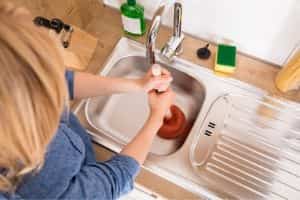
Now that fall is on its way to Colorado Springs, bringing with it holidays with a direct focus on cooking large, shared meals with family, it’s time to discuss the importance of kitchen plumbing safety.
As you open your kitchen and your home, make sure that you use caution when it comes to your cooking habits. Keep your home, your friends, and your family safe this holiday season, and guarantee Thanksgivings and Christmases for years to come.
Keep Your Kitchen Plumbing Clog-Free With Grease Traps
 When cooking larger, more elaborate meals, families tend to use more pots and pans than under ordinary circumstances. With that increase in dishes also comes an increase in the amount of grease that can potentially end up both in your sink and down your drain.
When cooking larger, more elaborate meals, families tend to use more pots and pans than under ordinary circumstances. With that increase in dishes also comes an increase in the amount of grease that can potentially end up both in your sink and down your drain.
In addition, many holiday meals are made with cooking grease and other high-viscosity fats, like lard, that tend to solidify as they cool. This leads to the potential for additional clogs in your kitchen plumbing. Using a grease trap can stop clogs before they stop.
This common kitchen plumbing device slows down the flow of hot water to stop the majority of grease as well as solid matter from entering your pipes and, ultimately, into the wastewater system. Make sure you have a working grease trap installed before inviting over all of those holiday guests. This will prevent an emergency service during your holiday festivities.
A Kept Secret to Keep Your Drains Clear
 One of the lesser-known secrets of kitchen plumbing that we love to share with the residents of Colorado Springs is the “hot water trick.”
One of the lesser-known secrets of kitchen plumbing that we love to share with the residents of Colorado Springs is the “hot water trick.”
While it doesn’t have to be done this frequently during the rest of the year, using it once weekly when you’re doing your heaviest cooking is recommended to keep your pipes free and clear of any blockages.
Start by boiling a large pot of water on the stovetop. Once it has reached a full boil, pour approximately half of the pot directly down the drain. After about five minutes have passed, pour the remainder of the pot down the drain as well. This helps to melt and loosen up any grease that may be trapped in your kitchen plumbing, which helps keep your drain clog-free and ready for action.
The Do's and Don’ts of Garbage Disposals
 One of the most common questions plumbers get asked is what they should and shouldn’t put into their garbage disposals. Knowing the dos and don’ts of using your garbage disposal can help you save both time and money on emergency kitchen plumbing services, especially during the holidays.
One of the most common questions plumbers get asked is what they should and shouldn’t put into their garbage disposals. Knowing the dos and don’ts of using your garbage disposal can help you save both time and money on emergency kitchen plumbing services, especially during the holidays.
You can put the majority of biodegradable food products down your garbage disposal. These food items include scraps of leftover meat, scraps of fruit and citrus rinds, and nearly all vegetable scraps.
However, there are a few things you absolutely should not put into your garbage disposal. While some people may argue that eggshells are safe, it is recommended that you don’t allow them into your disposal as they can potentially get stuck along the edges and slow down the motor.
Coffee grounds, bones, banana and potato peels, pasta/rice, fruit pits, and paper scraps should also not be allowed in the disposal, as they can all end up harming your kitchen plumbing system.
By following the few simple, easy-to-follow steps that we’ve listed above, you can keep your home and your kitchen plumbing safe this holiday season. If you do encounter any plumbing emergencies, please don’t hesitate to contact us here at B&L Plumbing by giving us a call at (719) 638-7341.

